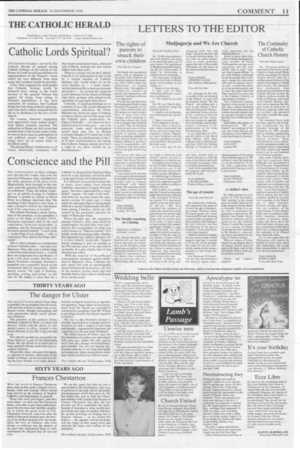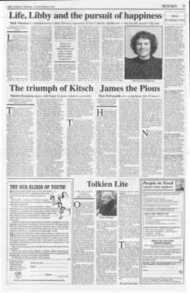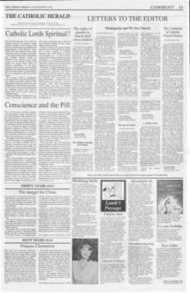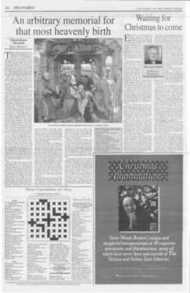Page 11, 18th December 1998
Page 11

Report an error
Noticed an error on this page?If you've noticed an error in this article please click here to report it.
Tags
Share
Related articles
Infallibility Or Indestructibility?
Watershed In Our History Of Faith
The Furore Over Humanae Vitae
Debate Moves On To Nature Of Papal Role
Pope Paul's Document Stands The Test Of Time
Conscience and the Pill
THE CONTROVERSIES in these columns over the last few weeks. first over the encyclical Humanae Vitae, and then over the wider question of the place of the Magisterium, have brought to the fore once again the question of the authority of conscience. Today, the debate continues: in an article on page 8. Cardinal Heenan is quoted as saying to David Frost, in a famous interview, that "the teaching of the Church is very clear. A man is bound to follow his conscience even if his conscience is in error."
This mirrors Newman's classic discussion of the question, in his pamphlet A Letter to the Duke of Norfolk (1875). Newman concludes that in the end conscience, however misguided, is supreme. and his discussion ends with his much quoted remark: "I shall drink — to the Pope if you please — still, to conscience first, and to the Pope afterwards".
This is often claimed as a vindication of those Catholics who — not only over Humanae Vitae, but over a whole range of doctrinal and moral issues — consult their own judgement first and Rome's, if at all, a very poor second. But this is to distort Newman's meaning. Newman's pamphlet was a powerful attack on the secularised idea of conscience, which merely asserts "the right of thinking, speaking, writing and acting" as one sees fit. He makes it clear that for a Catholic to dissent from Papal teaching must be a rare decision. arrived at after a long and testing self-examination.
It is difficult to avoid the feeling that in many cases today, even among Catholics, conscience, to quote Newman again. "has been superseded by a counterfeit", namely, "the right of self-will". And however we may assess the arguments current 30 years ago, it must surely be said today that it is increasingly difficult to justify intellectually the divisions among Catholics which are still caused by the persistent rejection by many of Humanae Vitae.
Three decades ago, the argument among Catholics who used artificial contraception was that they were justified by the uncertainties of what was acidly known as "Vatican roulette". It is hardly worth discussing today whether this argument was valid or specious: for it is now wholly irrelevant. Natural family planning is now as reliable as the Pill and has none of its side-effects on health. It is also wholly free of any abortifacient effect.
With the removal of the principal conscientious argument against obedience to Humanae Vitae, Catholics are now surely left with an unambiguous choice between the destructive self-will of the modern secular mind and that humility before God without which none of us can be saved.
blog comments powered by Disqus















